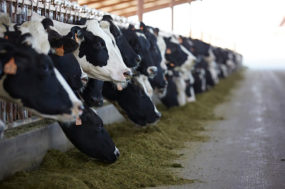Earlier this year, social media lit up with concerns from consumers over the consistency of butter and the potential link to animal feed supplements containing palm byproducts. In quick response, Dairy Farmers of Canada formed a working group of independent experts to assess the concerns raised and develop fact-based explanations to their questions.
The working group includes prominent academics and experts from across Canada with a diverse range of expertise.
“Each member has been selected based on their area of expertise to investigate specific issues related to the broad mandate of the working group,” says Daniel Lefebvre, chief operations officer of Lactanet and chair of the expert working group.
Members of the group specialize in areas such as dairy nutrition, animal health, sustainability, food science and human nutrition. Consumers, dairy processors and farm-level experts are also represented in the group.
At their initial meeting this spring, members of the working group established the following key objectives:
- Confirm whether there are or have been changes in the characteristics of butter
- Review the literature to assess current science as it relates to:
o Feeding of palm fat supplements to cows
o Milk composition
o Milk handling and processing techniques
o Health and safety of supplements (palm)
- Identify any gaps in data or research
- Review of the level of sustainability of various types of palm fat supplements, including byproducts
- Assessment of role and nutritional value of palm fat supplements for dairy cows
“In addition to the extensive work being undertaken by individual working group members, the full group has met four times for comprehensive discussions and expert presentations,” Lefebvre says.
To date, key presentations to the working group have included Professor Alejandro Marangoni from the University of Guelph, who presented his findings on butter testing, senior representatives from the Animal Nutrition Association of Canada, as well as senior officials from the Canadian Food and Inspection Agency (CFIA).
“We continue to meet regularly and will do so throughout the summer,” Lefebvre says.
The overarching goal of the working group is to deliver evidence-based conclusions on the hardness of butter and any relation to the use of palm supplements in dairy. The group’s conclusions will be informed by the best available peer-reviewed science.
“We are committed to evidence-based research and will follow the science. In addition to reviewing the existing body of knowledge, we will also identify gaps in research to make recommendations on a path forward,” Lefebvre says.
In addition to the activities of the working group, other researchers and interested parties in the industry have taken it upon themselves to initiate studies related to butter consistency and feed products.
This supplementary research is also of interest to the working group. Lefebvre says, “We welcome the other testing and research that is happening across the country to further add to the body of knowledge.”
As conclusions are made based upon the group’s findings, a report is being compiled chapter by chapter. It will be released to the industry upon completion.
Members of the Feed Supplementation Working Group
The working group includes prominent academics and experts from across Canada, with a diverse range of expertise. They are:
Daniel Lefebvre
Chair of expert working group
Chief Operations Officer, Lactanet
Lefebvre has a Ph.D. in dairy cow nutrition and physiology.
Anthony Hanley
Professor, Department of Nutritional Sciences, University of Toronto
Hanley has a Ph.D. in epidemiology with expertise in the nutritional and metabolic factors related to Type 2 diabetes.
Richard Bazinet
Professor, Department of Nutritional Sciences, University of Toronto
Bazinet researches the role of fats in human health. He has also studied the lipid profiles of grass-fed and conventional milk and beef.
David Kelton
Professor, Department of Population Medicine, University of Guelph
Kelton is a veterinary epidemiologist who has been working closely with dairy farmers and veterinary practitioners for over 25 years.
Rachel Gervais
Professor, Department of Animal Sciences, Université Laval
Gervais’ research focuses on the effects of diet and nutrition of dairy cows on milk composition and functional properties.
Yves Pouliot
Professor, Department of Food Sciences, Université Laval
Pouliot’s research expertise is on milk and dairy ingredients processing.
Jean-François Ménard
Senior Analyst, CIRAIG, LCA expert
Ménard has participated in numerous life-cycle analyses for both the private and public sectors.
Elaine Scott
Consumers’ Association of Canada
Scott participates in the Canadian Milk Supply Management Committee and has held the position of provincial nutritionist for the government of Saskatchewan.
Mathieu Frigon
President and CEO, Dairy Processors Association of Canada
Frigon holds a master’s degree in agricultural economics from Laval University, with over 10 years of experience in the dairy industry.
Ed Friesen
Board member, Dairy Farmers of Canada, Lactanet
Friesen is a dairy farmer in Manitoba, who has served on several board of directors of dairy groups in the last 15 years.
Bita Farhang
Research and Development Manager, Dairy Farmers of Ontario
Farhang provides expertise to provincial and national programs related to research, business and product development programs, niche market, nutrition and sustainability.
Woody Siemens
BC Milk Marketing Board (BCMMB)
Siemens currently works for the BCMMB, leading transportation, milk quality, animal welfare and business development functions.
Chantal Fleury
Assistant Director Economic Research – Agrology, Quebec Milk Producers
After growing up on a dairy farm, Fleury worked for CIAQ, and has been working for Les Producteurs de lait du Québec since 2013.









